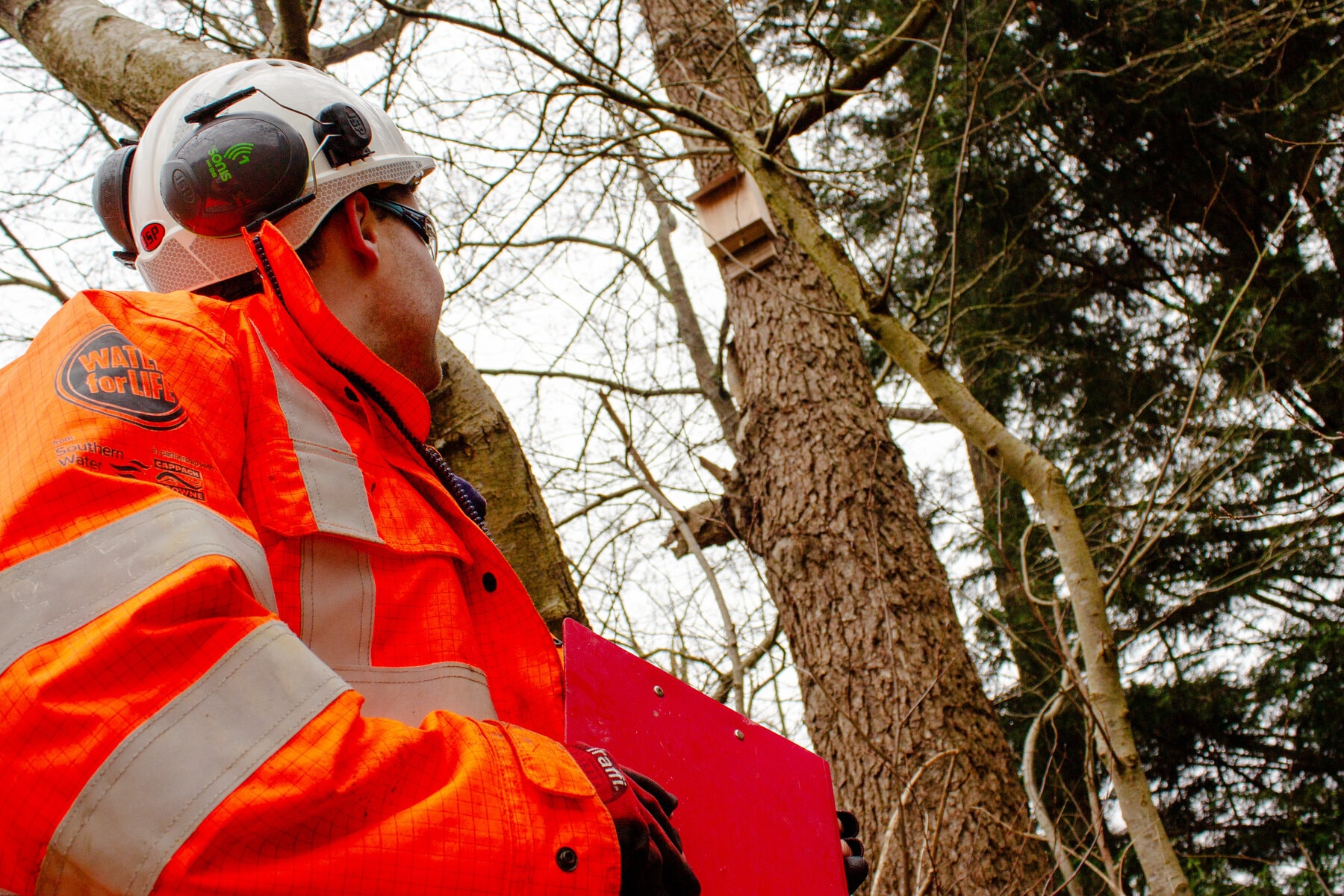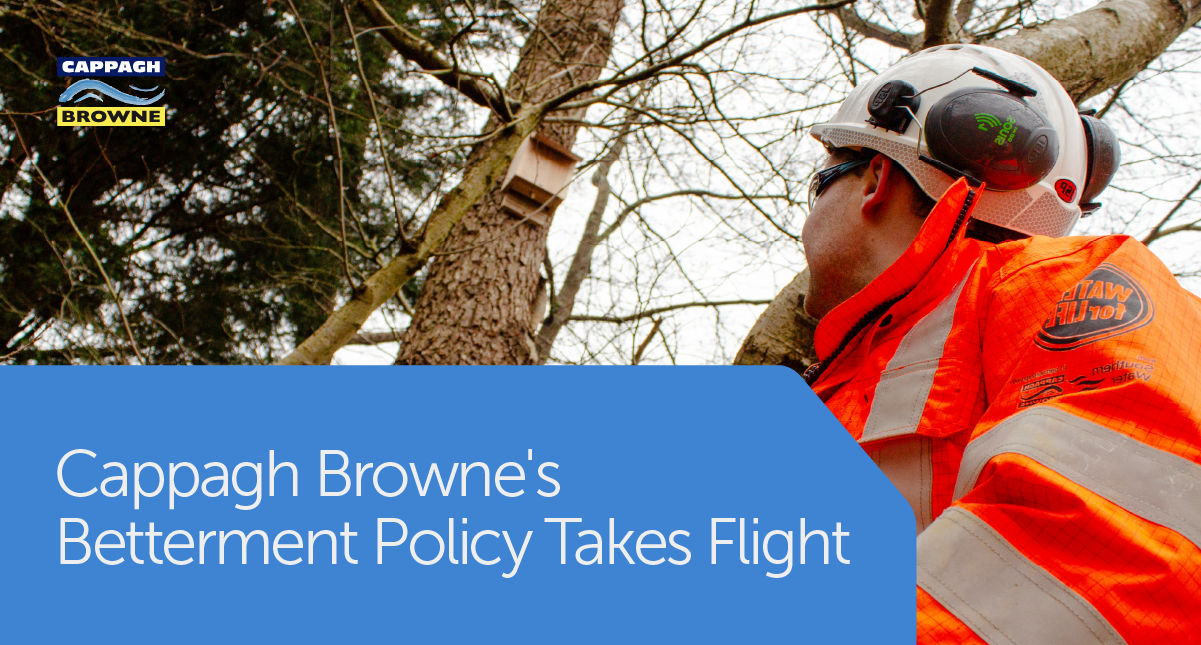Batting for Biodiversity: Cappagh Browne’s Betterment Policy Takes Flight
Category: Environment, News
Introduction
Batting for Biodiversity: Cappagh Browne’s Betterment Policy Takes Flight
The role of businesses in environmental conservation
By 2030, it has been estimated that declining biodiversity will cost the global economy $2.7 trillion every year (1). Against the backdrop of a rapidly changing natural world, conservation is a critical consideration. Businesses hold the power to shape a greener future through proactive engagement in conservation efforts. At Cappagh Browne Utilities Limited (CBUL), we recognise this responsibility and strive to minimise our ecological footprint while promoting sustainable practices.
Conservation goes beyond a moral obligation; it’s an essential tool in addressing pressing global challenges such as climate change, biodiversity loss, and environmental degradation. By safeguarding biodiversity, preserving ecosystem services, and championing sustainable resource management, we can contribute to building a greener future where both nature and businesses thrive in harmony. This isn’t about ticking boxes for corporate responsibility; it’s about a sincere commitment to sustainability.
Cappagh Browne delivers crucial wastewater network repair and maintenance services, operating within one of our most vital ecosystems. Our commitment to environmental stewardship is embodied in our Betterment Policy, a comprehensive programme aimed at leaving a lasting positive impact on the ecosystems we touch. We strive to improve local environments by planting trees, establishing bug hotels, and installing bird and bat boxes, ensuring they thrive; long after we have left the site.
Our response to the discovery of nocturnal neighbours near a sinkhole site in Oxted, offers an example of how CBUL bats for biodiversity…
Sustainability in action
During a recent project in Oxted, CBUL’s civils team expeditiously repaired a collapsed sewer in a residential garden, situated next to the River Eden. This type of habitat; large bodies of water, grassland and deciduous woodland, supports rich, interconnected and diverse ecosystems, and diligence in operation is required.
One particular local animal was brought to the teams attention. The waterways and ponds nearby serve as vital resources for bats, offering both hydration and abundant prey. These aquatic habitats attract swarms of midges and other flying insects; a bountiful feast for the bats. Daubenton’s bats, for example, are frequently observed skimming the water’s surface to capture various insects, while Pipistrelles commonly hunt above rivers or ponds near their roosts.
Trees, woodlands, and their accompanying vegetation also provide ideal habitats for a diverse array of insects, which form the primary diet for many bat species. The elusive Bechstein’s bat, one of the rarest bat species in the region, predominantly inhabits wooded areas in select parts of Southern England and South East Wales. They prefer to roost and forage within expansive woodlands spanning 25 to 50 hectares or larger, seldom venturing beyond these boundaries in search of food.
Upon completion of the work, and with the advice of a qualified ecologist, three bat boxes were strategically positioned within trees in the local area around the repair site, with the landowner’s consent. This initiative aimed to establish a secure roosting habitat for the diverse bat species known to inhabit the area.
Flying high
The Oxted bat installations are positioned near the River Eden, in close proximity to expansive water, grassland, and deciduous woodland. These structures are designed to provide a safe and secure place for various indigenous bat species to roost, breed and live. They are strategically placed to support local bat populations and their ecological role within the environment.
Tristen Parker, CB Environmental Advisor, sheds light on the significance of CBUL’s bat box installation initiative in Oxted:
“The strategic placement of our bat boxes along the dark tree line, next to good foraging ground, maximises the likelihood of bats discovering and utilising them as roost sites. The use of untreated wood ensures that the boxes emit no potentially harmful chemicals that could deter bats.”
Tristen elaborates on the importance of the initiative:
“Given the significant decline in suitable roosting habitats for bats in the South of England, due to historic tree felling, our initiative to install bat boxes will assist with conservation efforts. Bats are particularly vulnerable to habitat loss. By providing alternative roosting sites, we are directly contributing to the preservation of these species on a local scale. Moreover, by raising awareness about the importance of conserving bat habitats and providing practical solutions like bat boxes, we hope to inspire others to take similar actions. Collective efforts like these are essential for the long-term survival of bat populations and the ecosystems they inhabit.”
Embracing our responsibility
CBUL is actively contributing to habitat preservation and the conservation of biodiversity by implementing nature-based solutions, such as the installation of bat boxes. These efforts not only serve as natural pest control mechanisms but also provide educational opportunities for both our employees and the wider community.
One of the key impacts of our conservation initiatives is the creation of a culture of responsibility among CBUL employees. We conduct regular ecological and environmental briefings led by our specialist team members. These briefings not only ensure that our staff adhere to responsible working practices that prioritise environmental preservation but also foster a deeper understanding of the significance of their roles in supporting local ecosystems and communities. By fostering this culture of awareness and accountability, we are ensuring that our operations align with our values of environmental stewardship and sustainability.
The value of our bat box installations extends beyond their ecological benefits. These structures serve as valuable educational tools, allowing individuals to observe bats’ behaviour, reproduction, and social interactions up close. By understanding the types of bats attracted to bat houses and their environmental roles, people develop a greater appreciation for the positive impact bats have on the world. Moreover, bat boxes provide opportunities for children and adults alike to learn about the vital role bats play in maintaining ecosystem balance and biodiversity.
Through these initiatives, it becomes increasingly evident that every action we take, no matter how small, can help to shape the future of our environment. CBUL’s efforts not only mitigate the environmental impact of our essential infrastructure work but also contribute to the conservation of bat populations worldwide, which are facing significant challenges due to habitat loss and declining roosting sites.
Category: Environment, News
Tags: eco


